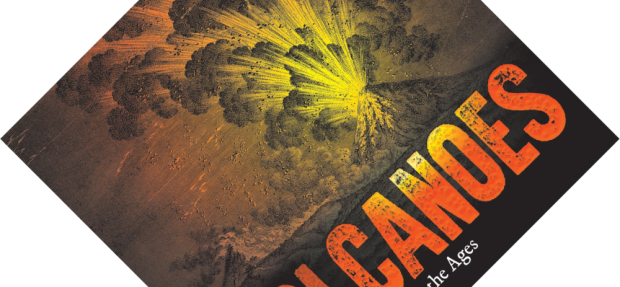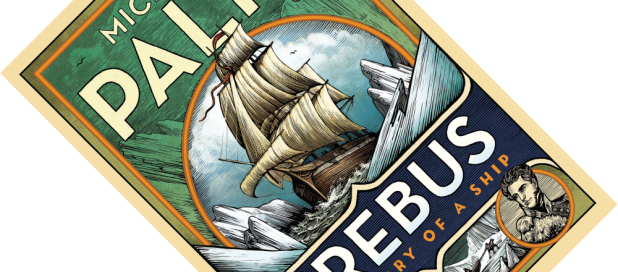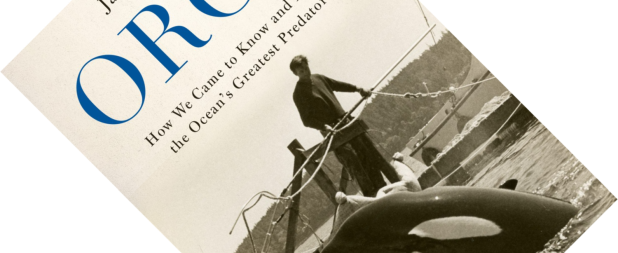I will immediately admit that I have retained a boyish fascination with volcanoes. And, as Volcanoes: Encounters Through the Ages shows, I am not alone. Written by volcanologist David M. Pyle to accompany a 2017 spring exhibition at the Bodleian Library in Oxford, this book brings together many historical illustrations from their collections to show how volcanoes have been represented and described over time, and how this has shaped our present understanding. I have not visited the Bodleian Library before, but this book makes me wish I had.
Author: inquisitivebiologist
Book review – Erebus: The Story of a Ship
They say you should not judge a book by its cover, but in this case, it was the very attractive cover that drew me to read Erebus: The Story of a Ship. Michael Palin, known equally for his early work as part of the Monty Python troupe as for his travel documentaries, here tells a riveting story from the golden age of polar exploration. A tale of high-spirited British imperialism, marine camaraderie, a warship that wasn’t, and the enduring mystery of a vanished Arctic expedition.
Book review – The Cradle of Humanity: How the Changing Landscape of Africa Made Us So Smart
The story of human evolution is constantly being refined with new findings and there is a glut of accessible books that cover this topic from various angles. Yet, with The Cradle of Humanity, geography professor Mark Maslin manages to provide an interesting and novel take on the subject, showing the reader how a happy combination of larger factors conspired to influence and steer our evolutionary trajectory. It could have ended up so differently…
Book review – How Scientific Progress Occurs: Incrementalism and the Life Sciences
This review is part of a double bill. Cold Spring Harbor Laboratory Press recently published How Scientific Progress Occurs: Incrementalism and the Life Sciences. In it, Elof Axel Carlson explores the relevance to biology of the ideas Thomas S. Kuhn formulated in his book The Structure of Scientific Revolutions. Having read both books back-to-back, this review follows on the one of Kuhn’s book.
Book review – The Structure of Scientific Revolutions (50th Anniversary Edition)
This review is part of a double bill. Cold Spring Harbor Laboratory Press recently published How Scientific Progress Occurs: Incrementalism and the Life Sciences. In it, Elof Axel Carlson explores the relevance to biology of the ideas Kuhn formulated in his book The Structure of Scientific Revolutions. This is one of those classics already on my to-do list, so I have read both books back-to-back and will review them one after the other. Anyway, who is this Kuhn and why should you care? Virtually everyone will have heard the buzzwords “paradigm” and “paradigm shift” – and for that, you can thank Kuhn.
Book review – The Edge of Memory: Ancient Stories, Oral Tradition and the Post-Glacial World
When I read the brief for The Edge of Memory, my first thought was: “Really, Bloomsbury is publishing a book on flood geology?” This creationist take on geology tries to interpret geological features in accordance with the Biblical account of a worldwide flood described in Genesis. If you haven’t read your Bible verses today, don’t worry, if I say “Noah” and “ark”, you probably know which one I mean. My guess was close, but not quite on the ball. Patrick Nunn, a professor of Oceanic Geoscience, here argues that ancient stories and myths hold within them descriptions of geological catastrophes and climatic changes. Welcome to the obscure academic discipline of geomythology.
Book review – Poached: Inside the Dark World of Wildlife Trafficking
Around the world, wildlife is under pressure. Habitat loss, hunting and poaching, invasive species, climate change – pressure is exerted on many fronts. One particularly insidious and ugly kind of threat is wildlife trafficking. Much like the illegal trade in narcotics, modern-day slaves, or counterfeited goods (and commonly connected to the same cartels), there is a vast and sprawling black market in animals – dead and alive – and animal parts. With Poached, journalist Rachel Love Nuwer presents an incredibly wide-ranging and thorough investigation of the drivers of this trade, its victims and measures to combat it.
Book review – Genetics in the Madhouse: The Unknown History of Human Heredity
Ask most biologists about the history of genetics and they will likely mention Watson and Crick’s 1953 discovery of the double helix structure of DNA or the work of the monk Gregor Mendel that showed a simple form of trait inheritance. Professor of History Theodore M. Porter contends that there is another, largely forgotten side to this story. Long before words such as genetics and genes had been coined, the fledgeling discipline of psychiatry was recording details of patients in mental asylums, collecting vast amounts of data on human heredity. Genetics in the Madhouse is a deep dive into the archives to reveal this little-known history.
Book review – Orca: How We Came to Know and Love the Ocean’s Greatest Predator
Orcas or killer whales have been at the centre of a swirling controversy for decades. Popular attractions in aquaria, their plight there has been highlighted in recent books and documentaries, further strengthening opposition to keeping cetaceans (i.e. whales, dolphins, and porpoises) in captivity. However, as Jason M. Colby meticulously documents in this book, there is a cruel irony at play here: this very practice of captivity is what raised our environmental awareness in the first place.
Book review – Microbes from Hell
I recently read about the American microbiologist Carl Woese (1928-2012) and his discovery of a completely new group of single-celled organisms, the Archaea, in Quammen’s book The Tangled Tree: A Radical New History of Life. These mysterious microbes thrive under extreme environmental conditions, so I was intrigued and keen to find out more. The French microbiologist Patrick Forterre here describes these microbes, the research that led to their discovery, and the questions and answers this has thrown up. Originally published in French in 2008 as Microbes de l’Enfer, The University of Chicago Press has now made this book available in English to a wider audience.










